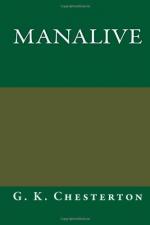“Rather a small box for you, sir,” said the waggish Mr. Gould.
“Splendid room, though,” answered Mr. Smith enthusiastically, with his head inside his Gladstone bag. “I love these pointed sorts of rooms, like Gothic. By the way,” he cried out, pointing in quite a startling way, “where does that door lead to?”
“To certain death, I should say,” answered Michael Moon, staring up at a dust-stained and disused trapdoor in the sloping roof of the attic. “I don’t think there’s a loft there; and I don’t know what else it could lead to.” Long before he had finished his sentence the man with the strong green legs had leapt at the door in the ceiling, swung himself somehow on to the ledge beneath it, wrenched it open after a struggle, and clambered through it. For a moment they saw the two symbolic legs standing like a truncated statue; then they vanished. Through the hole thus burst in the roof appeared the empty and lucid sky of evening, with one great many-coloured cloud sailing across it like a whole county upside down.
“Hullo, you fellows!” came the far cry of Innocent Smith, apparently from some remote pinnacle. “Come up here; and bring some of my things to eat and drink. It’s just the spot for a picnic.”
With a sudden impulse Michael snatched two of the small bottles of wine, one in each solid fist; and Arthur Inglewood, as if mesmerized, groped for a biscuit tin and a big jar of ginger. The enormous hand of Innocent Smith appearing through the aperture, like a giant’s in a fairy tale, received these tributes and bore them off to the eyrie; then they both hoisted themselves out of the window. They were both athletic, and even gymnastic; Inglewood through his concern for hygiene, and Moon through his concern for sport, which was not quite so idle and inactive as that of the average sportsman. Also they both had a light-headed burst of celestial sensation when the door was burst in the roof, as if a door had been burst in the sky, and they could climb out on to the very roof of the universe. They were both men who had long been unconsciously imprisoned in the commonplace, though one took it comically, and the other seriously. They were both men, nevertheless, in whom sentiment had never died. But Mr. Moses Gould had an equal contempt for their suicidal athletics and their subconscious transcendentalism, and he stood and laughed at the thing with the shameless rationality of another race.
When the singular Smith, astride of a chimney-pot, learnt that Gould was not following, his infantile officiousness and good nature forced him to dive back into the attic to comfort or persuade; and Inglewood and Moon were left alone on the long gray-green ridge of the slate roof, with their feet against gutters and their backs against chimney-pots, looking agnostically at each other. Their first feeling was that they had come out into eternity, and that eternity was very like topsy-turvydom. One definition occurred




